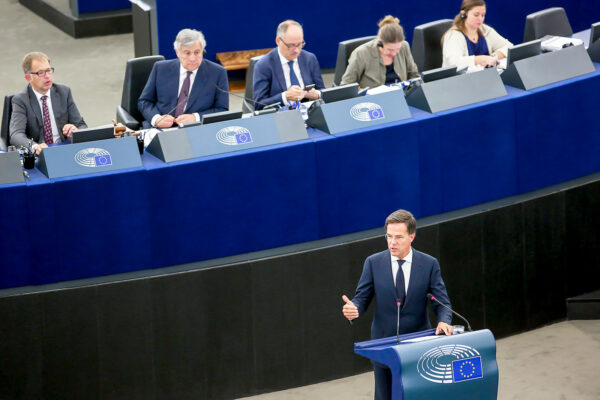
Dutch prime minister Mark Rutte is criticized from the left and center for failing to make the argument for the EU integration in his reelection campaign.
The Financial Times, which a few days ago selectively quoted from Rutte’s televised debate with far-right leader Geert Wilders to make him and not Wilders out to be the bigot, has listened to his critics and concluded that Rutte is following, rather than leading, Dutch public opinion on the EU.
That’s hardly an outrage in a democracy, but I don’t think it tells the whole story. The prime minister who once promised to give “not one cent more” to Greece (and then agreed to another bailout) has become more pragmatic about European integration.
Elevated
Dutch support for EU membership is up from a pre-Brexit low of 45 percent to 75 percent.
The Financial Times knows that Rutte has “supercharged Dutch diplomatic efforts in Europe and elevated the Netherlands to one of the EU’s major political players.” (I suggested Brexit would have that effect in 2017.)
The criticism is that Rutte hasn’t adequately defended those efforts at home, and his neglect may have “stored up future problems.” Which strikes me as alarmist given the aforementioned figures.
Nor is it the case that Rutte’s voters (of which I am one) are more Euroskeptic than the electorate at large. In fact, center-right voters are as pro-European as others.
Successes
Some of Rutte’s biggest successes in Brussels have been the things he blocked: a eurozone budget, European tax harmonization, eurobonds, a coronavirus recovery fund consisting entirely of grants. He’s not a champion of ever-closer union.
But he’s not an isolationist either. Rutte never used the Dutch veto. He only succeeded by forming coalitions of like-minded states, ranging from Austria to Estonia to Ireland. Rutte has taken the flak from countries that favor closer and faster integration (nobody in Italy was angry at Stefan Löfven), but his views, which emphasize economic over political integration, are shared across Central and Northern Europe.
Proposals
After thwarting a Franco-German push for protectionism, where he found the European Commission on his side, Rutte and his allies published their own proposals:
- Completing the single market in services.
- Removing barriers to labor mobility, including through mutual recognition of professional qualifications.
- Transitioning to a green economy.
- Setting global standards in artificial intelligence and the digital economy.
- Strengthening European capital markets to enable cross-border risk-sharing.
Many of the same countries favor an overhaul of the EU’s massive farm subsidies, of which France and Spain are the biggest beneficiaries, and they have consistently called for labor market liberalizations in Europe’s least competitive economies, including Italy.
Strategic autonomy
Rutte has come around to some of his French counterpart’s proposals for European “strategic autonomy”. Last year, I wrote here that Europe’s two leading liberals were on opposite ends of the debate. Now Rutte’s party, in its election manifesto, calls for:
- Public investment in promising startups to avoid them falling into foreign hands; and
- Banning competition from state-owned and -backed enterprises from outside the EU.
Emmanuel Macron, take heart.
Leading role
During Rutte’s ten years in power, the Netherlands has taken a leading role in European military integration, jointly procuring frigates and minesweepers with Belgium, integrating its air defenses with the other Benelux countries and sharing its panzers divisions and largest navy ship with Germany.
Rutte takes a hard line on Hungary’s and Poland’s rule-of-law violations, going so far as to suggest he would reconstitute the EU without them if those countries continue to undermine the independence of their courts and the free press.
He is a “cheerleader”, in the Financial Times‘ words, for the European Commission’s radical carbon emissions-cutting targets. The Netherlands’ own Frans Timmermans, a social democrat, authored the European Green Deal. The next Dutch government will almost certainly involve one party, perhaps two, which want to cut emissions faster than the commission mandates.
If the worst that can be said about Rutte is that he doesn’t boast about his accomplishments in the EU, he won’t lose my vote. I think his actions speak louder than words.
